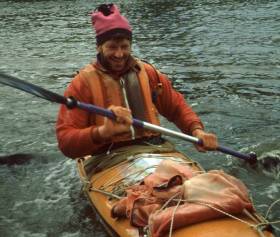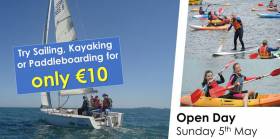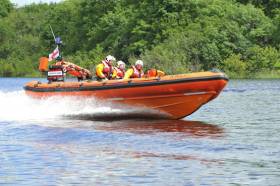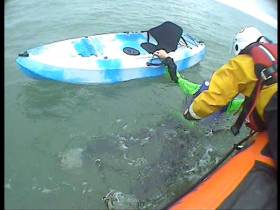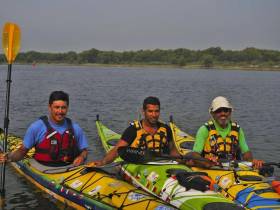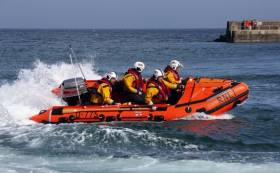Displaying items by tag: Kayaking
Galway’s Claddagh Basin may be a venue for next year’s Irish kayak polo intervarsities contest.
The event may take place in the city canal basin in February 2024, Galway City Council says.
It is one of several water polo activities which will take place in the basin, following efforts by the Lough Corrib Navigation Trustees to generate interest among watersports bodies in using the location free of charge.
 The Claddagh Basin has been used in the past for kayaking and water polo and, latterly, has been a location for illuminated gleoiteogs and other traditional craft, restored by Badóirí an Cladaigh Photo: Joe O'Shaughnessy
The Claddagh Basin has been used in the past for kayaking and water polo and, latterly, has been a location for illuminated gleoiteogs and other traditional craft, restored by Badóirí an Cladaigh Photo: Joe O'Shaughnessy
The Claddagh Basin has been used in the past for kayaking and water polo and, latterly, has been a location for illuminated gleoiteogs and other traditional craft, restored by Badóirí an Cladaigh.
Along with the Claddagh quays, it was constructed in the mid-19th century as part of the Eglinton Canal project and provided moorings for some 300 fishing craft working from the Claddagh village
When Galway City Council advertised earlier this year for expressions of interest in water-related activities, there were no replies by the closing date of May 12th.
The city council says that the late application for water polo activities ensures that it will be used this summer by Corrib Water Polo Club and Tribes Water Polo Club for training and matches.
 The 143m by 52m canal basin close to the river Corrib estuary is maintained by the Lough Corrib Navigation Trustees for Galway City Council under the 1859 Navigation Act Photo: Joe O'Shaughnessy
The 143m by 52m canal basin close to the river Corrib estuary is maintained by the Lough Corrib Navigation Trustees for Galway City Council under the 1859 Navigation Act Photo: Joe O'Shaughnessy
“In addition, there will potentially be a kayak polo event in February 2024, which forms part of next year's Irish Kayaking Intervarsities Competition,” the city council said.
The 143m by 52m canal basin close to the river Corrib estuary is maintained by the Lough Corrib Navigation Trustees for Galway City Council under the 1859 Navigation Act.
The trustees, including city councillors, are responsible for the maintenance of navigation aids, a limited number of piers on the Corrib system, maintenance of the Eglinton Canal system, associated walkways, towpaths, lock gates and boundary walls.
MCIB Report Into Death of Student Kayaking on Kerry River
The Marine Casualty Investigation Board (MCIB) report into the death of a Donegal student during a kayaking trip in Co Kerry has said the outing was not properly assessed for risk.
Aisling O’Connor, 21, from Ballyshannon, Co Donegal, drowned after she became trapped under a tree branch in the Upper Caragh river near Glencar, Co Kerry, on November 2nd, 2019.
She was among a party of 27 on a trip organised by the University of Limerick (UL) Kayak Club.
The UL biochemistry student was resuscitated and transferred by helicopter to University Hospital Kerry, but she died two days later.
Another kayaker required medical resuscitation and hospitalisation, and the MCIB described his situation as “a near fatality”.
The 202-page MCIB report called on the UL Kayak Club to “immediately review its procedures and assessments prior to embarking on group river activities” and to examine its procedures in relation to Canoeing Ireland (CI) standards.
It has also recommended the kayak club should “suspend its activities until its safety regime is audited to a standard acceptable to Canoeing Ireland”.
The report says the prevailing conditions, including the features of the river, were “not suitable for all the members of the trip to manage safely”.
It says the trip was” not properly assessed for the risks attached to the prevailing conditions and having regard to the skills and experience of the group taking part in what is a high-risk sport”.
It says those in charge of identifying and assessing the risks in advance, and on the day, were “insufficiently trained and experienced themselves to be able to assess the risks given the combined factors of river conditions and the nature of the group”.
It says this arose as there was “a lack of adherence to the ULKC Safety Statement 2014 and the Trips Policy and Procedure which set out control measures, which led to a lack of accredited training, which in turn led to poor decision making”.
It says that had there being CI- qualified instructors available (or persons with recognisable equivalent training and experience) they “would have identified that the group was too large and its makeup too inexperienced and would not have approved a trip that involved a group of beginners in those conditions, and/or, having embarked would have realised that the conditions being experienced were not suitable and would have terminated the trip”.
It says the gaps in the club safety environment were “contributed to by the lack of any supervision/audit, or capacity to effectively supervise or audit, of the safety of university students engaged in high risk activities by the UL Students’ Union, and by the absence of any overarching, agreed, and communicated, spheres of responsibility between the ULSU and UL, leading to an environment at club level where there was a serious disregard of the ULKC Safety Statement 2014 and Trips Policy and Procedure, and CI recommended standards”.
The report notes that the Upper Caragh River was” a Grade 4 river on the day and a Grade 3 with parts at Grade 4 normally”.
“The river trip planners and leaders did not correctly gauge the river as a Grade 4 river despite the elevated river levels,” it says.
“The recent heavy rains in the locality resulted in the river level being higher, current flows being considerably faster and more powerful to the degree that the intermediate paddlers had difficulties in controlling their boats,”it says, noting that two casualties – one of whom died - were intermediates at Level 2 and Level 3 Skills competency.
The MCIB report says that “river trip planners and leaders made no risk assessment for the river trip on the Upper Caragh River”.
“Had they done so, the assessment of the corrected river grade that day (Grade 4) would have significantly affected the planning of the river trip process and either altered the composition of the river trip groups and/or the conduct of the river trip or may have re-directed the trip to a more suitable venue,” it says.
“ The absence of a comprehensive risk assessment was a causative factor in the capsize incidents,”it says and the kayak club’s 2014 safety statement was not adhered to.
The report says the absence of a contingency plan in the event of the leaders and seconds requiring closer supervision of an increased number of inexperienced kayakers due to the prevailing river conditions was a “contributory factor” in this incident.
The MCIB report makes a number of recommendations for UL Kayak Club, UL Students’ Union and UL, along with the Minister for Transport and Canoeing Ireland.
In its comment on the draft report, the UL Kayak Club defended planning for the trip.
In a joint statement, UL Student Life and University of Limerick said they were “extremely conscious of the heart-breaking loss of life at the centre of this tragic accident”.
“We remain absolutely committed to the health, well-being and safety of our student community of over 18,000 students,” they said.
“The MCIB report into the incident which occurred during a planned outing of the UL Kayaking Club in November 2019 contains recommendations that are relevant to UL Student Life, the UL Kayaking Club, University of Limerick, Canoeing Ireland and the Minister for Transport,” they said.
“UL Student Life and UL have and will continue to work together to consider the findings of the final MCIB Report and to implement the recommendations so that the highest possible safety standards are in place within all clubs to which our students are affiliated,” they said.
“While this was a most tragic accident, it is acknowledged that lessons can and will be learned as well as improvements made to ensure the safety of our student community,” they said.
A link to the full report is here
MCIB Report into Kayaking Incident Last Year off Dalkey Critical of Organisational Factors
An investigation into an incident where a party of 15 kayakers encountered difficulties during a round trip from Bulloch harbour to Dalkey island on Dublin Bay last September has found that “disregard for Met Éireann forecasts” contributed to a decision to embark on a “potentially unsafe tour”.
All kayakers returned or were rescued in the incident which occurred on the evening of September 13th, 2020, but one of the kayakers was in the water for 40 minutes and unable to return independently.
The Marine Casualty Investigation Board (MCIB) report published yesterday (October 28th) notes that while a small craft warning was not in place earlier that evening, it was in place by the time the group was setting out to sea.
The MCIB says that an” apparent complete disregard” for the instructor training regime run by Canoeing Ireland (CI), the national governing body for kayaking, “seems to have contributed to the decision to embark on a potentially unsafe tour”.
 A photo of two canoes ashore at Bulloch Harbour from the MCIB report
A photo of two canoes ashore at Bulloch Harbour from the MCIB report
The party of 15 kayakers involved three instructors and 12 participants on a guided kayak coastal trip from Bulloch Harbour to Dalkey Island and back of approximately 2.86 nautical miles.
Both kayaks with cockpits and “sit-on-top” kayaks were used, the report says.
After leaving Bulloch harbour, the kayakers became separated into two groups with a “small group drifting northwards” and a “large group” making its way “(eventually) to the north end of Loreto Convent”.
Three “999” calls alerted the rescue services to the incident, recording "concern on the part of members of the public that the kayakers were struggling”.
The calls said that “some had become separated from the main group and were drifting towards Dublin harbour; that one seemed to have capsized; that a kayaker appeared to be in the water; that the instructors were rushing to assist; that the “small boat” (presumably a reference to the Royal National Lifeboat Institution inshore lifeboat should be sent to assist; and that the kayakers were in trouble”.
One of the kayakers capsized three times. An Irish Coast Guard ((ICG) rescue helicopter, RNLI all weather (ALB) and inshore (ILB) lifeboats and a land-based Irish Coast Guard crew responded, as did the tour organiser who paddled out to bring a group of nine kayakers ashore at Loreto College. However, in emails to the MCIB investigator, the organiser says her concern for the group's safety was "nothing to do with my tour or the conditions".
"It was caused in its entirety by the disruption to their equilibrium with the sudden and unnecessary arrival in our space of the ICG search and rescue helicopter, the RNLI ALB and the ILB lifeboats and the ICG land-based vehicle," she states.
"The approaching tsunami of rescue services swarming around my guests suggested an urgent and imminent danger where none existed," she stated by email.
The investigation was unable to determine the precise level of skills of all instructors, and notes that at least two of the participants did not have sufficient experience for the conditions.
It says “the qualifications ascribed by the organiser’s observations to one or other of the instructors (kayaking level 3 sea skills, kayaking level 4 training and kayaking level 2 instructor) “did not meet the appropriate qualifications recommended by CI for an instructor taking out a group in conditions similar to those which were encountered on the tour”.
The weather report was noted moderate to fresh winds of Beaufort force 4 or 5.
It says the organiser’s observations did not refer to the Code of Practice for safe operation of recreational craft, and the report says “it is reasonable to assume that no regard was had to its contents” and that this contributed to the decision to embark on a “potentially unsafe tour”.
A fisherman who assisted one of the two groups of kayakers recalled that local conditions were such that the combination of an ebb tide with wind from the south/south west had the effect of wind against tide giving rise to “white horses” and a sea swell of approximately 1.5 metre, the report says.
“While this contradicts the data evident from the tidal streams... challenging sea conditions were encountered,” it says.
It says the overall ratio of participants to instructors was in keeping with that identified by CI’s website, namely a ratio of 1:4.
The report says two of the participants indicated that no warnings were given to them that they would become immersed in the water, and that “they were not told what to do in the event of their becoming immersed in the water”.
It says the fisherman “noted that the female kayakers whom he took on board were tired, cold, wet and fatigued and would not have made it ashore on their own”.
The report says that one of these was “in an uncontrolled situation in and out of the water for a period of approximately 40 minutes”.
This participant told the report of feeling “in deep water” shortly after leaving the calm of Bulloch harbour “in the sense that she believed she had no control over the direction of her kayak and that the waves were taking her where they wanted”.
She “recalled being terrified, not being able to speak and having to try to attract the attention of the instructors by waving her hands”.
A big wave flipped her over and her personal flotation device “burst open”, but still remained on her upper body.
She was separated from her kayak for a time, swallowed sea water when swimming back to it, and was “coughing and expending energy” in a bid to keep her head above water, before being assisted.
Two instructors were unsuccessful in addressing the situation, it says, and when the third instructor arrived – leaving the larger group unsupervised, or supervised by the organiser who had to paddle out to them – the kayaker described having to be held in her craft by that instructor.
She was treated by two ambulance paramedics on her arrival back at Bulloch harbour, and recalled they were concerned with the amount of sea water she had swallowed.
The larger group drifted towards rocks, and the organiser paddled out to meet them. The report quotes a participant in this larger group recalling that when they disembarked on the rocks, an Irish Coast Guard officer instructed them to wait where they were, and to get onto a lifeboat which would be along shortly.
“This instruction.... was countermanded by the organiser who instructed them to make their way over the rocks, on foot,” the report states.
The investigation was told that another participant in the large group asked the Irish Coast Guard officer and the organiser “to stop giving conflicting orders as it was confusing”.
“This participant’s recollection was that she would have preferred to follow the directions of the Irish Coast Guard, as she was not happy about climbing over the rocks as she did not have proper footwear and she was anxious and fearful about slipping”.
“According to this participant, the organiser was adamant that the large group should climb over the rocks and the large group duly did so, without incident,” it says.
“They were unable to access a gate through a wall at the top of the rocks and had to make their way around the wall onto other (less slippery) rocks and then onto a flat shore where they were met by the Irish Coast Guard officer,” it says.
It says the organiser took issue with the Irish Coast Guard officer’s use of the word “hypothermia” in a radio report..
The report says that “as no records were made available, it has not been possible to determine what contingency planning was in place”.
It says that the forms signed by any of the participants on the tour were not provided to the investigator.
“According to one participant, she completed a form for her first excursion with the organiser a month previously but did not complete a second for the tour while the other participant does not recall completing any form,” the report says.
“ The form contains a detailed purported waiver of any liability on the part of the organiser. It is not the function of this report to comment on its legal validity,” it says.
The report also notes that “a waiver of liability form is not a substitute for the proper assessment of conditions and participants in a sporting or recreational activity on the water”.
The organiser, who was not one of the instructors, denied that one of the participants was in the water for 40 minutes.
The organiser stated of this participant that “on the 13 September we had a client who was not keen to get back into her kayak and who was feeling tired”.
“She was eventually returned to her kayak with the help of three instructors. If one floats in the sea, the effect of wind and water will carry you somewhere. That is the nature of floating in the sea. It doesn't mean that the conditions were inappropriate,” the organiser said.
The report also quotes the organiser as saying “one woman capsized more than once and needed some convincing to get back into her kayak. I have no wish to embarrass anyone and I don't see the need to say any more other than she was eventually returned to her kayak, and that she was not in the water for 40 minutes, though she was in the water for longer than usual”.
It also says there appears to be no record of any communication over VHF between the tour group and the organiser or instructors, such VHF “traffic” as is recorded on the Irish Coast Guard SITREP and report exchanged between the emergency and rescue services and the fisherman to coordinate the operation.
The report notes several draft reports preceded the final report, and changes were made “where they were warranted”.
It says the organiser detailed her own qualifications, stating “I am a level 4 instructor and hold the highest level skills award which is level 5”. She also said she is a tutor and can train and assess instructors.
It said that the organiser “does not consider regard should be had to CI, as she asserts that the current awards are “not fit for purpose for tour guiding as opposed to providing more in depth instruction”.” It says the organiser stated that a capsize drill is carried out at the harbour, but “no information has been provided as to who gave this instruction for this tour, nor as to what the content was on the date in question”.
It quotes one participant as stating no capsize drill took place.
It says that during the course of the investigation, the organiser of the tour was asked to provide certain records within the meaning of Section 30(1) the 2000 Act and to provide any additional information relating to the incident. It says “no such records or additional information were made available, over and above various statements about the incident made by the organiser in written exchanges in which she raised a number of issues.
The report says that on December 18th, 2020, the organiser wrote to the deputy director of the Irish Coast Guard requesting the “retraction, withdrawal and correction of the IRCG SITREP” for the incident.
The report makes a number of recommendations in relation to more effective delivery of the Code of Practice safety content, and says “consideration should be given to the establishment of a directory of commercial providers of coastal sea and river paddle facilities”.
The report says “consideration should be given to how best to enhance safety standards within the commercial paddlesport provider sector, including whether a mandatory registration or licencing scheme which requires the registration of instructors and their qualifications should be introduced”.
It says “consideration should be given to a mandatory requirement that commercial providers of coastal sea kayaking facilities register in advance with the local Coast Guard to ensure that the rescue services are aware, in advance, of the group’s itinerary, departure and return times, as well as numbers in the group”.
It says mandatory use of suitably licensed VHF radios by commercial providers of coastal sea kayaking facilities should be considered.
It says that CI in conjunction with Sports Ireland should “consider establishing a programme” to facilitate it in “establishing a scheme for the mandatory audit of safety policies and practises in clubs in collaboration with related sport national governing body, and, insofar as it is possible, the audit of instructors in commercial paddlesport providers”.
It says CI should consider “whether a safety audit and compliance system could be developed within its instructor training and registration system so that registered instructors have training in relation to safety requirements including those in the Code of Practice and Marine Notices, and so that CI could better contribute to safety through its regulation of its accreditation and registration system”.
The 240-page report includes lengthy appendices exchanges of communications between the organiser and the investigator. The report is downloadable from the MCIB website here
Double Medals for Ireland at the Freestyle Kayak European Championships
Kayaking in Ireland has had two new pages added to its history books, with the first medals ever being won in the discipline and Ireland's first-ever European Champion being crowned.
At the recent Championships, held on the 2024 Olympic course in Varies-Sur-Marne, near Paris, David McClure became Irelands first-ever European Champion in Freestyle in the K1 Men division. He sealed his victory with an emphatic win over Joaquim Fontane I Maso, the current World Champion. David, who currently coaches Ireland's next generation of Freestyle athletes, had an ideal set-up for Saturday's final, winning the semi-final and finishing second in the qualification round.
 Aoife Hanrahan won a bronze medal in the K1 event
Aoife Hanrahan won a bronze medal in the K1 event
In a demonstration of the depth of the Irish team who were competing in Paris, the Championships also saw Ireland's first-ever medal being won in the Women's competition. Aoife Hanrahan, also currently studying for a full-time degree in Pharmacy, won a bronze medal in the K1 event, just behind Poland's Zofia Tula. Aoife had brilliant momentum throughout the entire competition, having qualified in second place from the semi-final.
This championship saw one of the biggest teams Ireland has had at a major international, with 18 athletes competing across the various categories.
Ireland by Kayak: Paddler Timmy Flavin's Log
“Stop for a quick apple and orange drink. Paddle on in flat water. Stop for cake and try throwing a lifebelt onto a beach...”
“ Arrive Courtown at about 11.15 to champagne and a congratulations cake reception! A lifetime trip was over....”
Timmy Flavin’s understated diary entry on June 16th, 1991 was recorded after a 942-mile paddle around the coast of Ireland with his fellow kayaker Donal Dowd.
Enduring stinging armpits, swelling fists, cracked lips, missing Raybans, endless storms and unplanned capsizes, the pair set out from Courtown pier, Co Wexford on May 11th, 1991.
After paddling through phosphorescent waters to the Saltee islands, they spent their first night with an orphaned chick in a nestbox provided by the Irish Wildbird Conservancy – as Birdwatch Ireland was then.
The pair paddled an average of just over 31 miles a day until they reached Courtown again four weeks later. The log kept by Flavin - in his best broad Cork accent- has now been published as an illustrated book by his wife Bríd Farrell as a tribute to her late husband’s epic adventure.
Flavin records both indispensable details for the kayaker contemplating a similar circumnavigation, and memories of people that he and Dowd met along the route. As Dowd says, “the ever-changing sea provided us with both tranquillity and white-knuckle fear..”
There are the peaks and troughs of an Atlantic swell, and there is also much humour. Leaving Ballywalter for Annalong, Co Down, on the final leg down the Irish Sea, Flavin reached for his Raybans, couldn’t find them, “and nearly collapsed with shock...” Somehow he survived squinting in the bright sunlight. By the time they pair reach Howth, north Dublin, their fragile hands could grip a paddle but could barely hold a litre of milk or orange juice.
The log includes an equipment list with useful comments on what was and wasn’t required. A silk scarf was “invaluable and essential, while a helmet “ was never used, not carried from Malin onwards”.
“Loose leaves” from a diary were “posted home regularly”, Flavin wrote, and “postage-paid cards were used”, but there was no reading material packed – “no book, no space”. There is also advice on food in the “menu” section, where the nightcap was “white coffee, sugar, Ovaltine, biscuits..”
Timmy Flavin died four years ago of cancer, and the book includes moving tributes to him penned by Donal Dowd, Tony Noctor and by Michael O’Sullivan, a colleague in the ESB where Flavin worked.
“A gentle quiver of a breeze must have passed over the MagGillycuddy’s Reeks and across the Atlantic waters to the Sceiligs, Blaskets, Bull Rock and down the channel of the Blackwater on the 28th May 2015, when Timmy Flavin took his last breath on earth,” O’Sullivan writes, charting the career of a “giant of a man”, proficient at both kayaking and orienteering and a volunteer instructor at Cappanalea outdoor pursuits centre in Co Kerry.
It was at Cappanalea that his future wife, Bríd, met him. All profits from her late husband’s log are being shared between the Kerry University Hospital’s Palliative Care Unit, and the RNLI Valentia lifeboat station, in Co Kerry.
At the Water’s Edge: Two Boats – Around Ireland by Kayak by Timmy Flavin is priced €15 and copies are available directly from Bríd Farrell at email address: [email protected]
Try Sailing And More At INSS Open Day This Sunday
The Irish National Sailing & Powerboat School is hosting its annual Open Day this Sunday 5 May with opportunities to try sailing, kayaking or paddleboarding for only €10.
Children aged 7 and up and their families can get to grips with the INSS’ fleet of 1720 Sportboats, as well as easy-to-master sit-on-yop kayaks and popular stand-up paddleboards, guided by the school’s experienced instructors.
Waterproof overalls and lifejackets will be provided for sailors, wetsuits and buoyancy aids for kayakers and paddleboarders, and hot showers will be provided after your fun on the water — so all you need to bring is your enthusiasm!
Three times slots are available on the day (10am-12pm, 12.30pm-2.30pm and 3pm-5pm) and booking must be made in advance. For more details see the INSS website HERE.
Kayaker Dies After Lough Ree Incident
#LoughRee - RTÉ News reports that a man has died after an incident while kayaking on Lough Ree yesterday afternoon (Saturday 4 March).
Coastguard and RNLI teams recovered the casualty, believed to be an experienced water sportsman, after he went missing between Hodson Bay and the village of Lecarrow. He later died at Portiuncula Hospital in Ballinasloe.
Youghal Lifeboat Rescues Man Found Clinging To Kayak
#RNLI - Youghal RNLI has rescued a man who was found clinging to his kayak yesterday afternoon (Sunday 19 February) after he was in the sea for up to 45 minutes.
The volunteer crew was requested to launch their inshore lifeboat at 2pm after a member of Youghal Coast Guard who was driving past Redbarn beach observed what he thought to be someone in trouble in the water.
The lifeboat, helmed by Patsy O’Mahony and with crew members John Griffin, Eddie Hennessy and Martin Morris onboard, launched at 2.08pm and arrived on scene four minutes later, where they found the kayaker had got into difficulty one mile from the beach.
Weather conditions at the time were described as good, with a Force 2-3 north-westerly wind. The tide was falling and the water while calm was cold.
On scene, the lifeboat crew observed the kayaker clinging to his board. He had been unable to get back into the seat on top of the kayak and was showing signs of hypothermia after being immersed in the cold sea for up to 45 minutes.
The casualty was quickly recovered from the water and administered casualty care on the lifeboat and back at the lifeboat station until a doctor from the East Cork Rapid Response unit arrived. The kayaker was then transferred by ambulance to Cork University Hospital.
Speaking following the callout, Youghal RNLI lifeboat operations manager Derry Walsh said: “The kayaker, who was wearing a lifejacket when he got into difficulty this afternoon, had been in the water for a long time before he was spotted and he was suffering from hypothermia when we reached him. Time was of the essence and I have no doubt that a life was saved.
“I would like to commend the member of the public and the member of the coastguard unit here in Youghal who spotted the kayaker in difficulty and raised the alarm. Our crew responded rapidly and used their skills and training to administer casualty care. The kayaker was lucky today and all at Youghal RNLI would like to wish him a speedy recovery following his ordeal.”
Walsh added: “We would always encourage everyone taking to the sea to respect the water. Always carry a means of calling for help and keep it within reach. Wear a personal floatation device. Check the weather and tides. Tell someone where you are going and when you will be back. Wear appropriate clothing for the conditions and your trip.”
Cork Man Kayaking Persian Gulf For Ocean Awareness
#Kayaking - A Cork man is in the midst of an epic kayaking expedition along the Persian Gulf to raise awareness of the region’s marine environment, as the Evening Echo reports.
Colin Wong from Bishopstown is close to Abu Dhabi as part of a three-man team that set off from Kuwait over two months ago, and by the time they reach Muscat in Oman they will have covered more than 2,000km along the Gulf’s western coast.
The trio are paddling under the banner of Kayak4Kuwait, with the aim of raising awareness about the importance of the sea to the countries of the Persian Gulf.
While the journey is Wong’s biggest and most demanding expedition, the 32-year-old is no stranger to long stints on the water, kayaking the River Nile in Uganda last November after placing second in the Liffey Descent marathon.
The Evening Echo has more on the story HERE.
Newcastle Lifeboat Rescues Man Clinging To Kayak
#RNLI - Newcastle RNLI was requested by Belfast Coastgaurd to launch to the aid of what was believed to be a dinghy in trouble a half-mile south of Newcastle Harbour on Saturday afternoon (31 December).
However, when the inshore lifeboat arrived on scene, the crew discovered that the callout was to three kayakers in trouble, with one man found clinging to his kayak in the freezing water and unable to get to safety.
The lifeboat volunteers observed one kayak being towed by another but only one person was visible. On further investigation it was established there was one person in the water further along the shoreline.
Proceeding further south, the lifeboat crew located a male clinging to the front of his kayak, unable to get to safety.
The person was recovered from the freezing water onto the lifeboat and the crew carried out the RNLI’s ‘casualty care’ before returning to Newcastle Lifeboat Station to await the arrival of the Northern Ireland Ambulance Service.
The lifeboat then went back to the scene to rescue a further kayaker and his kayak while Newcastle Coastguard recovered the third casualty from the shore line. The casualties were transferred into the care of paramedics.
“Another five minutes and we could have been dealing with a completely different outcome,” said Newcastle RNLI lifeboat helm Alan Jones. “The water is absolutely freezing at this time of year.”


























